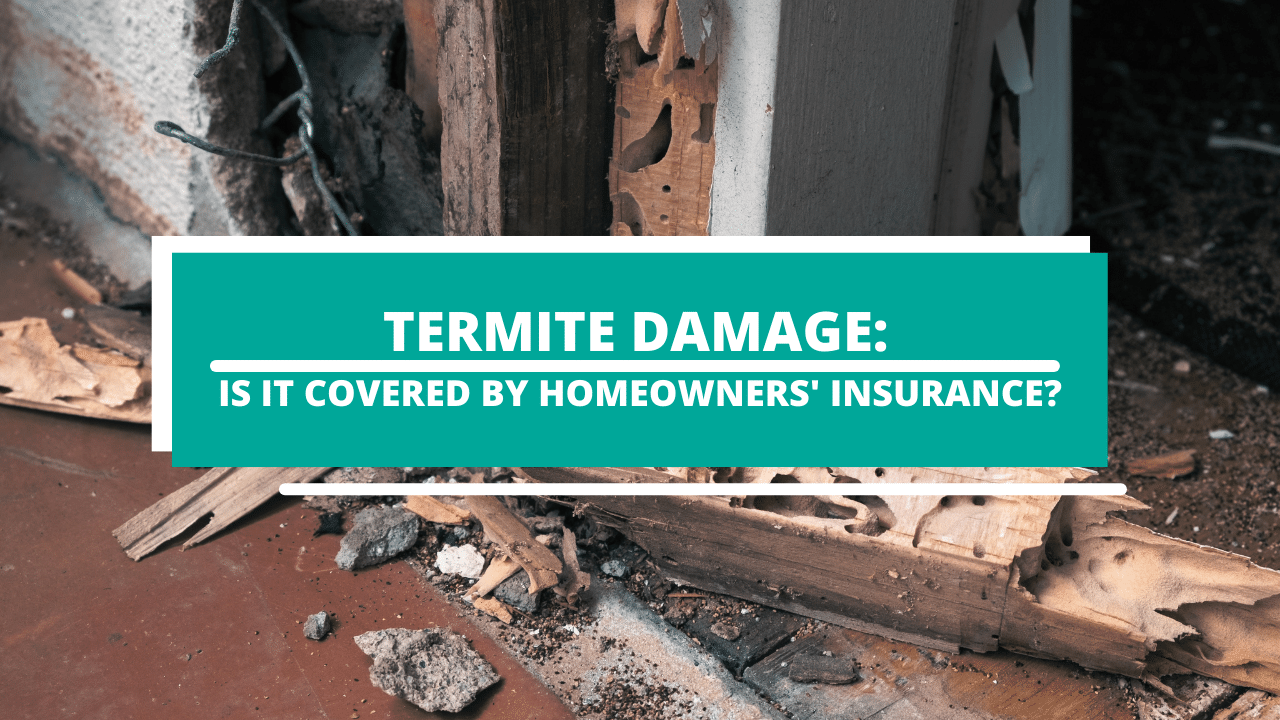Termite damage is a serious problem in many households, causing American households combined over $5 billion every year. A good portion of this money could be saved by taking simple precautions to lower the risk of an infestation but sadly most don’t consider that until it’s too late.
If you’re reading this article either you’re a proactive person looking to inform yourself just in case, or you already have a problem. For most occurrences that could cause damage to your home you turn to your insurance provider, but does homeowners’ insurance even cover termite damage?
According to the National Association of Insurance Commissioners, most homeowners’ insurance policies will not cover damage from termites or other insects. There are a few situations in which a policy might cover termite damage, but don’t count on it. With that in mind, it’s important to take preventative measures against termites and other insects because the cost of fixing the problem can be far more than the cost to prevent it.
How to Know if You Have Termites in Your House?
Part of the reason most homeowners’ insurance policies don’t cover termite damage is because it’s not sudden or unexpected! 9 times out of 10 you can see significant evidence of a termite infestation before any real damage is caused, so it’s important to keep an eye out. One of the biggest clues that you might have termite damage is drywall with small holes in it, discoloration, or even peeling paint. An even more obvious sign is the bugs themselves! You can often see flying termites called swarmers around your house when you have an infestation, and sometimes you’ll find their dead wings discarded on the ground.

Situations where Termite Damage would be Covered
As said previously, although the vast majority of termite damage isn’t covered by homeowners’ insurance, there are a few instances where it is. It’s important to be informed in case you find yourself in one of these situations:
Termite Damage Causes the Home to Collapse
Obviously, this situation is incredibly rare, but if your home collapses due to termite damage it will be covered by your homeowner’s insurance policy. For this to apply, however, the termite damage must have been hidden and unbeknownst to you. Damage caused by the homeowner’s neglect in full knowledge of a termite problem will not be covered.
Termite Damage Causes a Fire
Another unusual situation, if a termite infestation eats through wires and causes a fire, it will typically be covered by your insurance. Homeowners insurance usually covers any fires regardless of the cause.
Termite Damage Caused by Something Covered by Insurance
This is a scenario to pay attention to, if your home has termite damage that was caused primarily by something else your insurance covers, the termite damage may be covered as well. Let me give you an example. Most homeowners’ insurance policies will cover fire damage or damage caused by a water leak.
Well, if fire damage exposed your house to termites or excessive moisture and damaged wood from a water leak attracted the termites in, you can file a claim for the fire or water damage and odds are they’ll cover the termite damage as well. This doesn’t work in every situation but it’s something to ask your insurance company about should the situation arise.
How to Treat Termite Damage
According to the National Pest Management Association, most termite damage cannot be effectively treated by the homeowners. If you discover termite damage in your home, the next steps should be to immediately get in touch with a contractor to repair any structural damage and to get in touch with a pest control company to eradicate any existing bugs and prevent further damage.
If you believe your termite damage may have been caused by a water leak or something else covered by your insurance provider, you’ll need to file a homeowners insurance claim. Fix any damage that could cause immediate problems as quickly as you can, and your insurance company will send out an insurance adjuster to assess the damage and determine whether you’re eligible for compensation through your insurance policy.

How to Prevent Termite Damage
Dealing with termite damage can be seriously expensive, which is why we recommend taking preventative measures to avoid having a problem in the first place. The average cost to repair termite damage is $3300, and it can get even worse if the damage compromises the structural integrity of your home. By contrast, the average professional termite treatment comes out to only $560. (Related: Termite Treatment: A Cost & Consumer Guide) A small price in the short term to save you a lot of money in the long run. Research pest control companies in your area or ask friends who have used pest control services before for their recommendations.
If you don’t want or don’t have the money to pay for professional pest control right now, there are still plenty of things you can do as a homeowner to keep termites away. First of all, as mentioned earlier, one of the biggest things that draws termites in is excessive moisture. This creates a nice humid climate for bugs and also can soften the wood of your home’s structure making it easier for termites to dig through. You can avoid having too much extra moisture by using a dehumidifier, keeping your gutters from getting clogged, and ensuring that when rain or water from a hose puddle outside it’s diverted away from the foundation of your home.
Another thing that helps keep termites away from your house is keeping anything that might be home to them away from your walls. If you keep wood for a stove or lumber for building materials on your property, make sure these piles don’t touch the outside of your home and keep them stacked on top of something instead of touching the ground directly. Termite damage repair can be a nasty and expensive process, so do what you can to keep it from happening.

